In their recent post, Madison McCartha gestures towards the surveillance logics embedded within contemporary media. Invoking Édouard Glissant, they end with a call for poets and artists to resist the colonial desire for transparency, embracing opaque surfaces—surfaces that, like the Solarian ocean, resist assimilation, reduction, and, to quote Glissant, “apprehension” (Poetics of Relation 193).
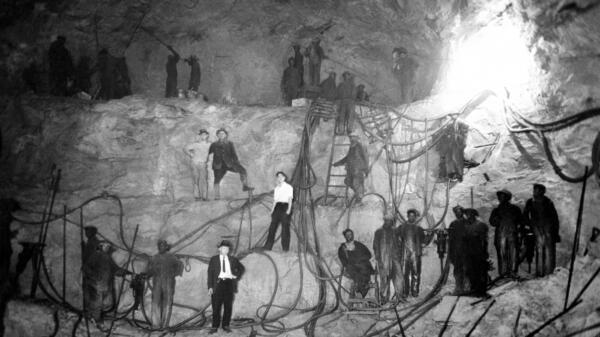
Hawks Nest Tunnel, West Virginia. A drilling crew poses for the above photo in 1931.
I want to build, however, off one of the examples that Madison introduces—Muriel Rukeyser’s “The Book of the Dead,” the long poem at the center of her book US-1. As Madison suggests, this text is consistently placed within the discourses of “documentary poetry.” While this subgenre doesn’t really have an agreed-upon definition, we can examine some texts frequently cited as documentary – e.g., Reznickoff’s Testimony, Mark Nowak’s Shut Up Shut Down, and C.D. Wright’s One With Others – and glean some common characteristics: an emphasis on social engagement; witnessing and documentation as a political act; the frequent use of found, non-“literary” materials; and the refusal of critical traditions that view the poem as a monolithic, closed-off lyric object. “The Book of the Dead,” which documents the Hawks Nest Tunnel Disaster of 1931 in West Virginia, fulfills all of these categories. A decidedly anti-capitalist work, it aims to expose the dangerous working conditions of the mining industry, and places this instance within a broader trajectory of transhistorical class struggle: “These are our strength, who strike against history” (Collected Poems of Muriel Rukeyser 109). The title “The Book of the Dead” refers, of course, to the ancient Egyptian funerary text of the same name, and within Rukeyser’s project, the poet is a medium, a conduit for the victims of class struggle throughout history: “Carry abroad the urgent need, the scene, / to photograph and extend the voice, / to speak this meaning. // Voices speak to us directly” (110).
It’s an intensely thought-provoking, complicated poem. From an ethical standpoint, however, the text is fairly ripe for critique, and struggles with problems that are frequent within documentary traditions, whether poetic, filmic, or journalistic: the presumption of speaking for others (to give a “voice to the voiceless,” as the cliché goes); the risk of eroding geographic and historical specificity in the service of a broader argument; and more generally, the lack of analysis of one’s own subject position as documentarian. (Rukeyser, after all, was from New York City, and grew up attending fancy schools; I say this not to invalidate her project, but rather, to point out that she was decidedly an “outsider” within the geography she aimed to document.) In the opening lines of the text, Rukeyser depicts a quasi-cinematic road trip from New York City, away from the “tall central city’s influence,” into West Virginia: “These roads will take you into your own country,” she writes. I’ll admit that – as someone who studies rural poetry, and who comes from a rural place – I find myself rolling my eyes at this line. It invokes the binary, center-periphery logic through which mainstream culture often represents the rural. Even while Rukeyser aims to uncover extractive colonial violences in West Virginia, she falls into the ultimately colonial logic of theorizing Appalachia as both naive (“simple” [73]) and wild (“The land is fierce here” [73]). Moreover, the suggestion that driving to West Virginia “will take you into your own country” affirms the cliché of rural spaces as the monolithic heartland of “real” America. (An ideological fiction, I should add, that recurred relentlessly in the mainstream U.S. media in the wake of Trump’s election.)
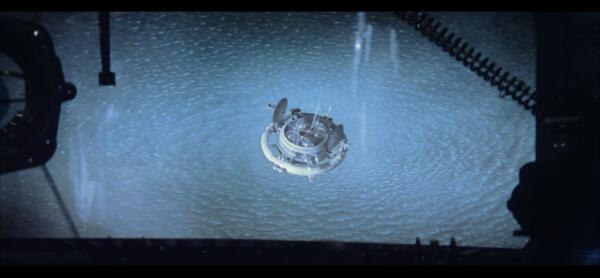
Solaris (1972) Directed by Andrei Tarkovsky
In any case, my aim is not to shit on “The Book of the Dead.” Rather, I want to take the discourses that Madison’s post introduces – the vision of poetry as an opaque, inassimilable surface that resists the surveilling, colonial gaze – and to put this ethos in dialog with rurality. Like the Solarian surface that Madison describes, my favorite rural poets do not theorize their own geographies through the lens of rubbernecking tourists; rather, they say fuck you to extraction and fuck you to property, evoking region as a complex, variegated tapestry suffused with feeling, histories of sociopolitical struggle, and the language of locality. They revel in the status of the geographic margin, or, often, explode the category between center and periphery altogether. If the modernist canon has historically presented the city as a messy, tangled mass that resists easy legibility, an experimental rural poetics might aim to depict the country with a similar level of density and complexity. Frank Stanford, from The Battlefield Where the Moon Says I Love You: “this is a map that no one can follow / it is a map I can’t even read.” When I think of an opaque rural poetics, I think of historical antecedents (e.g., Lorine Niedecker, besmilr brigham, C.D. Wright), and I think of contemporaries—such as, for example, Evie Shockley’s work; its frequent employment of dense syntax and ghostly rhyme, gesturing towards memory’s suffused, interwoven relationship with hidden geographies and historical violence:
east of childhood, north of
……………………capital offenses, just west
…………of a big blue treasure chest :
…………………….wet coffin of neglected bones.
……………..in the veins…
cloud-hooded mountains.
…………outside time : a coltrane solo.
…………………………..far from fatal. after all. (The New Black 19)
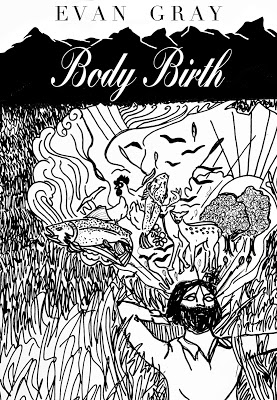
When I think of rural excess, I think of the poet Evan Gray, who works within the lineages of poets associated with Black Mountain College (while simultaneously disclosing that institution’s paradoxical, often invisible relationship to its immediate North Carolina locale); who employs the language of ecstatic rage, rebuking the way in which capitalism seizes upon territory, “marking” the earth:
MAN MARKS THE EARTH WITH RUIN
RAT RUIN GUN RUIN FIGHT RUIN
I HATE RUIN
WHITE RUIN SKY RUIN CAR RUIN BOY RUIN
MAN MARKS THE EARTH WITH RUINED OCEANS…you are dead here in the field
but haunt the trailer beyond the creek (Body Birth 11-13)
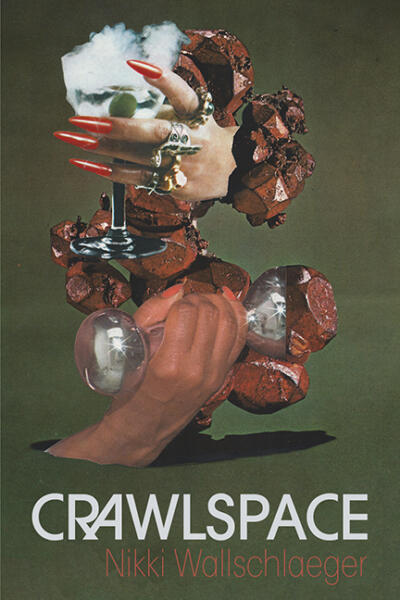
When I think of rural agriculture, I think of the poet Nikki Wallschlaeger, whose work often depicts the forms of extraction that, colluding with capitalism and white supremacy, produce violent, exclusionary foodways: “Los Angeles will become more and more like Los Angeles… / the chefs will be selective about who deserves to / eat food that was grown on the farms outside the cities” (Crawlspace 72). Within her work, I see a vision of agency shaped by provisional attachments to region—a vision that, as a reader, gives me a reason to feel hope:
Holding you in the garage, holding you in the woods. Holding you on the couch. Holding you in the air…
Holding what I’m really saying. Holding how I cuddle my cat. Holding how I hold it together. Holding another paycheck, a ghost homespun from spools of watery veal,
Holding all the residual toeholds that are telling me to do this (Houses 75-76)
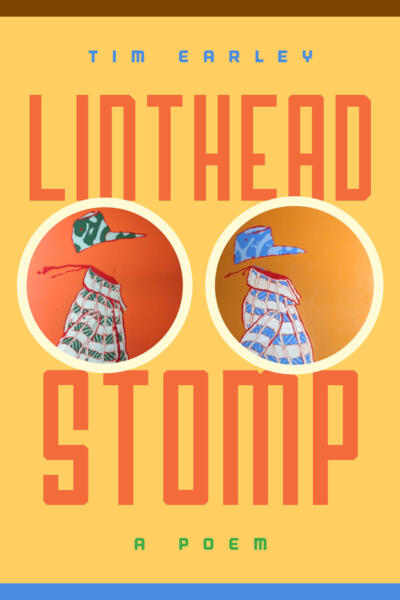
In terms of texts that, like “The Book of the Dead,” aim to document specific class-based struggles in rural locales – but do so from an insider perspective – I think of Tim Earley’s epic, criminally under-read Linthead Stomp, which explores, among other subjects, the closure of textile factories in Western North Carolina:
FUCK NAFTA.
This is what I say when she tears all her dresses apart and the tiny rabbits eat our halting perimeter.
I assent to each of her swearing folkways which make her underwire parts a thicket of robotics and deep parlance.
When the ground undo me blithe spirit.
Will you sever all the things we might could have done. (44)
Elsewhere in Earley’s text, a local vernacular collides with the language of scientific rationalism, socio-economic rage (both contemporary and historical), religion, and the social-capital-fuckery of the U.S. “poetry community” and its unspoken centers:
Whistle Pig, peaked, job it with a stick, job that shit with a stick, catched the tree frog, I knowed to throw it back, Jesus face, Sissy Holler, we is just folks and these is just some cultural interstices, “the absence of teeth, and the compromised nature of the gums, give the tongue freer range, and indeed, create an almost limitless field for linguistic play and invention. Teeth have everything to do with the Lord and social Darwinism and distract the poet from his orphic emptiness,” gum it up in the Berkeley, gum it up in the New Yorks City, POETRY! POETRY! POETRY! you subhuman fucks (43).
This is not, I should add, a canon-building exercise or an attempt to build a LitHub-style listicle of “rural poets you must read.” I’m uninterested in endeavors to consolidate a stable “rural aesthetic.” (After all, as Raymond Williams and many others have shown, the “city” and the “country” often take the form of ideologically constructed categories that exist to conceal class struggle.) I hope, rather, for a way of thinking through geographies often excluded from avant-garde discourses—and to understand, more broadly, the way in space might mediate poetry, and the way in which poetry might mediate space, opaquely resisting the gaze of the capitalist, imperialist Eye. To close, quoting Tim Earley, once again: “That is some unassimilable shit.”